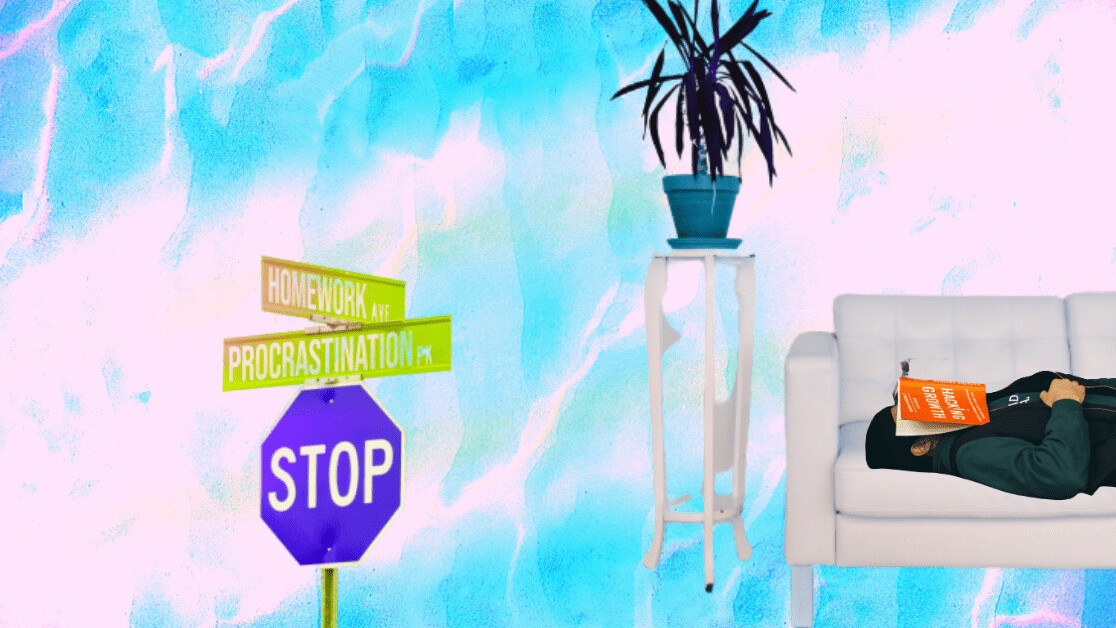
You have an impending deadline but instead of fulfilling that particular task you find yourself cleaning your entire house, folding socks, or going for a walk.
If that’s you, I’m sorry to say that you’re one of many procrastinators, which by definition refers to an individual who habitually puts off doing things.
It’s a popular — and very unhappy — club whose members often find themselves in unnecessarily stressful situations.
[Read: 3 reasons why working from bed is actually good for productivity]
So, why exactly do we procrastinate?
In my experience, procrastination is not just about willpower — or the lack of it.
Procrastination is often driven by a host of negative emotions including anxiety or the fear of failure. Think about it: how many times have you put off doing something because it seems too difficult or because you’re absolutely terrified of doing it wrong?
Exhaustion can also be a driver for procrastination. If you’ve been working continuously for several hours, it can be harder to self-motivate.
Rewards also play a vital role. If you’re getting paid to do something, or a pay rise or promotion hinges on the potential success of a project, you’re much more likely to complete it in a timely manner.
How to stop
Now that you know why you procrastinate, here are a few simple tricks to help you stop doing so and boost your productivity at work.
Be organized
It may sound like pure common sense but it’s important to get organized and how you do so will depend on how you like to work.
If you’re someone who prefers visual aids, you may want to consider investing in a whiteboard.
If on the contrary, you like to write stuff down in a portable notebook or device, try and get yourself a planner or download a suitable app.
There’s absolutely no right way to do this, you just have to do what works for you.
Be realistic
You need to set yourself simple, achievable goals.
Don’t write mammoth to-do lists. Avoid setting yourself up for failure by jotting down huge tasks that won’t be completed on time. It’s daunting and totally counterproductive.
Instead of telling yourself that’ll you get to Inbox Zero, prioritize the emails you need to respond to that particular day.
If you need to write a client report, don’t commit to writing the entire thing unless it’s feasible. Work in sections and give yourself sensible timelines and deadlines.
Break all tasks down into achievable chunks, that way you’ll feel much more focused and at ease.
You’ll need a schedule
As a student, I used to set myself a strict study schedule — this meant I was able to devote specific times to particular subjects and had a better overview of what I was expected to learn every day, week, and month. Work is no different.
Break your day into sections based on what tasks you perform better before and after lunch. If you’re more creative in the morning, schedule all brainstorming sessions during this time.
If you focus better in the afternoon, make sure you deal with all research-focused activities or client calls towards the end of the working day.
You get the gist…
Make yourself accountable
It’s so easy to think “One day, I’ll organize my desktop,” or “I’ll get to that client proposal eventually.” Truth be told — and let’s be real — “one day” or “eventually” will never, ever, come.
This is why it’s important that you make yourself accountable by setting your own deadlines — and by this, I mean actual dates, not just “end of the month.” Specificity is key.
My biggest piece of advice would be to always try and get your work done before a deadline. This gives you a little more leeway should unexpected tasks land on your desk.
Always communicate your deadlines to team leads or colleagues, that way you know they can hold you accountable too.
Remove all distractions
If you’re completely glued to your phone all day long, make sure to get rid of it before you start working – or else risk spending countless hours scrolling through Instagram or sharing every fleeting thought on Twitter.
If you share a flat or a house, make sure you let people around you know that you’re working and need to focus.
Tune in to music or white noise to drown out noise or chatter.
If all else fails, consider changing your working environment — set up base in the garden, the kitchen, wherever you can get some peace and quiet.
It’s all about timing
As a journalist, I’m constantly on a deadline so I’ve figured out a way of working that makes sense for me.
From experience, I know how long it takes to write and research a news piece or a feature — and I know all too well just how time much I need to spend on reaching out to sources. So, I time myself.
Again, it’s all about breaking down specific tasks into manageable chunks of time. If I’m writing a feature, I usually allow at least a couple of days for outreach and research. I know the writing is what takes me the least amount of time to do, so I work in hours.
So if you’re daunted by the amount of work you have to do, make sure you break down every task into hours. If you do this well, you’ll feel more productive and you’ll avoid feeling burnt out.
Just so you know, the perfect formula for productivity is to work for 52 minutes and break for 17.
Breaks are essential
You need to take regular breaks every once in a while.
So, when your timer goes off, make sure you get up from your desk or computer and move around.
Do whatever helps you unwind: scream into a pillow, load the dishwasher, take a nap or fold socks.
Dangle a reward
Who doesn’t love a prize? I know I do.
It’s important to motivate yourself with incentives, or rewards, no matter how small.
When I was a student, I used to get all my homework done on Friday afternoons as it meant that I could spend the whole weekend doing things I actually enjoyed and there were no Sunday evening panic attacks!
All my friends thought I was a bit of a loser but I really had the last laugh.
Leave the best till last
This next piece of advice is absolutely life-changing: get the hard stuff done first.
By tending to the least enjoyable task, you can incentivize yourself with all the stuff you actually want to do once you’ve finished your task.
Now, stop procrastinating and get cracking!
Get the TNW newsletter
Get the most important tech news in your inbox each week.




